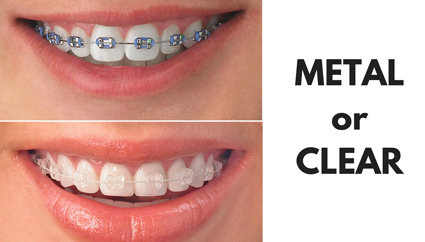Metal Braces
Often also called “traditional braces,” metal braces have two basic components. These are the metal bracket that is applied to the teeth and the bendable metal wire that is threaded through the brackets in order to apply pressure to the teeth and ultimately move them.
This is the type of braces that most teenagers get, because they are the least expensive version and are often the fastest way of moving teeth into their ideal locations.
Strength: Metal braces are higher in strength as compared to Ceramic braces when compared over a longer period of time.
Level of difficulty: Metal braces can withstand higher levels of forces as compared to ceramic braces. Thus, if your case needs more correction of malocclusion then your orthodontist will advise you metal braces.
Sensitivity: Metal braces in rare cases may result in hypersensitivity in the oral cavity. Ceramic braces have no such issues with their usage.

If you and your dentist decide that metal braces are the right choice for your orthodontic needs, some things to keep in mind include
- Avoid foods that aren’t braces-friendly. Avoid chewy foods, like caramels or other soft candies, as well as very hard or crunchy foods that could damage your braces. Certain fruits and vegetables can get stuck in your braces, and should be cut into small pieces. Your practitioner will likely give you a list of foods to avoid to keep your braces in good shape and decrease your risk of cavities.
- Brush and floss appropriately. Taking proper care of your teeth is always important, but it is especially true when you have braces. Brushing and flossing regularly will keep your braces looking good and help you avoid staining to your teeth. Your dentist may recommend you use a special brush designed to get into the crevices and different surfaces in metal braces. It may take some practice to learn how to brush and floss around your braces, but it will get easier with time. Learn more about proper flossing techniques in the Colgate Oral Care resources.
- Keep your followup appointments. Seeing your dentist and orthodontist regularly allows for any adjustments to the braces to be made and gives you an opportunity to have any questions or concerns addressed.

